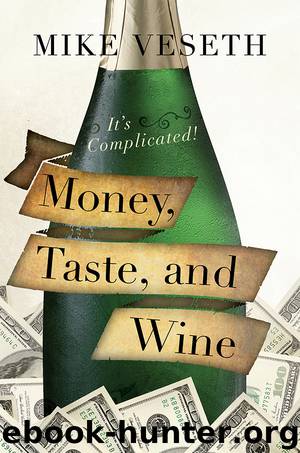Money, Taste, and Wine by Veseth Mike

Author:Veseth, Mike [Veseth, Mike]
Language: eng
Format: epub
Publisher: Rowman & Littlefield Publishing Group, Inc.
Published: 2015-04-14T16:00:00+00:00
Chapter 9
Wine Snobs, Cheese Bores, and the Paradox of Globalization
Simon Kuper is a global citizen, and so like a fish in water, he sees globalization from an insider’s perspective. Born in Uganda of South African parents and raised in the Netherlands, he lives in Paris and writes about global sport and global affairs for the British newspaper Financial Times (FT). His 2013 FT column “An Everyday Taste of Happiness” is on the surface an appreciation of good food.1 Paris has great food, Kuper writes, and he wonders at one point whether he would live in Paris if its food was bad? No, he’d probably stay—he loves Paris—but he had to think about it. Eating isn’t just taking on fuel, as it might have been back in the meat-and-potatoes days. It’s now a source of nearly endless variety and pleasure.
And it’s not just in Paris that these daily pleasures present themselves. You can find pretty good food just about everywhere these days—even in places like England, which was once famous for bad food—and globalization is partly responsible. “Globalization tends to improve cooking,” according to Kuper, and I think he is right. Immigration, long-term movements of people, means global movement of their cuisines, enriching the host country’s food scene. Global tourism means that millions are exposed to foreign foods and food ideas, and they bring their new tastes back home.
The Global Cheese Bore Epidemic
How important is this cultural cuisine mix? Very important, at times. In 2013, for example, British prime minister David Cameron declared a national culinary crisis.2 It seems that his government’s immigration policies were found to be undermining Britain’s national cuisine, which is “curry,” or Indian food, not fish and chips or pints and pies, as you might otherwise assume. The Economist reported that the inability of skilled chefs to enter the country was stifling the industry.
“Chefs have become like gold dust,” says Enam Ali, a restaurateur and founder of the British Curry Awards. The Economist reports that visa rules require chefs to speak English and earn at least £20,300 ($32,500) a year, far above the typical salary for a curry house cook. While in theory experienced chefs are given “occupational-shortage” immigration priority, in practice few of the cooks are able to qualify. Result? A shortage of labor—and of the skills, techniques, and authentic tastes these chefs bring to the British food scene.3
When the prime minister’s favorite curry house was targeted by immigration officials looking for illegal workers, something had to give, and Cameron pledged his support for a key British industry and promised to help curry restaurants keep their competitive edge. “Like any industry this one faces its own specific challenges and I know that there have been questions on immigration and getting chefs with the necessary experience. So let me promise you this—we will work through this together. We’ll continue to help you get the skilled Asian chefs you need,” he said, according to press reports, while speaking at the annual British Curry Awards ceremony.4
People power—migrants and tourists—are not the only ways that globalization affects the food you eat.
Download
This site does not store any files on its server. We only index and link to content provided by other sites. Please contact the content providers to delete copyright contents if any and email us, we'll remove relevant links or contents immediately.
| Buying Guides | Cellars |
| Champagne | Collecting |
| Spirits | Whiskey |
| Wine | Wine Pairing |
| Wine Tasting |
Whiskies (Collins Gem) by dominic roskrow(42207)
101 Whiskies to Try Before You Die by Ian Buxton(42175)
Whiskies Galore by Ian Buxton(40327)
Craft Beer for the Homebrewer by Michael Agnew(17445)
Right Here, Right Now by Georgia Beers(3497)
Not a Diet Book by James Smith(2723)
Water by Ian Miller(2580)
The Coffee Dictionary by Maxwell Colonna-Dashwood(2529)
Kitchen confidential by Anthony Bourdain(2306)
Coffee for One by KJ Fallon(2006)
Smuggler's Cove: Exotic Cocktails, Rum, and the Cult of Tiki by Martin Cate & Rebecca Cate(1979)
Beer is proof God loves us by Charles W. Bamforth(1919)
Superfood Smoothie Bowls: Delicious, Satisfying, Protein-Packed Blends that Boost Energy and Burn Fat by Chace Daniella(1901)
Talking as Fast as I Can by Lauren Graham(1828)
Bourbon: A Savor the South Cookbook by Kathleen Purvis(1790)
A Short History of Drunkenness by Forsyth Mark(1717)
Eat With Intention by Cassandra Bodzak(1686)
Cocktails for the Holidays by Editors of Imbibe magazine(1624)
Colombia Travel Guide by Lonely Planet(1608)
